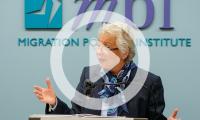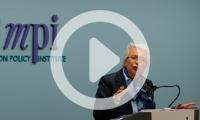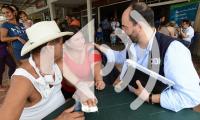
Andrew Selee
President
Andrew Selee is President of the Migration Policy Institute (MPI), a global nonpartisan institution that seeks to improve immigration and integration policies through fact-based research, opportunities for learning and dialogue, and the development of new ideas to address complex policy questions, a position he assumed in 2017. He also chairs MPI Europe's Administrative Council.
|
Media Requests |
Dr. Selee’s research focuses on migration globally, with a special emphasis on immigration policies in the United States, Latin America, and the Caribbean. He is the author of several books, including, most recently, Vanishing Frontiers: The Forces Driving Mexico and the United States Together (PublicAffairs, 2018) and What Should Think Tanks Do? A Strategic Guide to Policy Impact (Stanford University Press, 2013).
He has published opinion articles in Foreign Affairs, Foreign Policy, and Americas Quarterly, and he contributes a regular column to Mexico’s largest newspaper, El Universal. He is an adjunct professor at Georgetown University, teaching courses on global migration, and has previously taught at Johns Hopkins and George Washington universities and been a visiting scholar at El Colegio de México.
Dr. Selee was a Co-Director of the Regional Migration Study Group, convened by MPI with the Wilson Center, and part of the steering committee for MPI’s Independent Task Force on Immigration and America’s Future. In the late 1990s and early 2000s, he served on the Board of Directors of the YMCA of the USA, the nation’s largest membership organization.
Prior to joining MPI, he spent 17 years at the Woodrow Wilson Center, where he founded the Center’s Mexico Institute and later served as the Center’s Vice President for Programs and Executive Vice President. He has also worked as staff in the U.S. Congress and on programs with migrant youth in Tijuana, Mexico.
He holds a PhD in policy studies from the University of Maryland; an MA in Latin American studies from the University of California, San Diego; a BA, Phi Beta Kappa, from Washington University in St. Louis; and a certificate in strategic perspectives on nonprofit management from Harvard Business School. He was selected as an Andrew Carnegie Fellow for the 2017-18 period.
Bio Page Tabs
Over recent months, the number of Central American migrants apprehended at the U.S.-Mexico border has surged, presenting a critical challenge in the relationship between the two neighboring countries. Experts from a Study Group on U.S.-Mexico Migration convened by El Colegio de México and MPI discuss current trends, policies, and politics surrounding migration from the Northern Triangle of Central America and the U.S.-Mexico relationship, ways to improve U.S. and Mexican asylum systems, possible new approaches to labor migration, ways to address smuggling networks, and modernize border management.
MPI's Kathleen Newland, Refugee Council USA's Mary Giovagnoli, and David Scott FitzGerald, author of Refuge beyond Reach, discuss how and why international and national responses to the rising challenge of refugee displacement are diverging.
Durante su primera visita oficial a Washington, DC, la Secretaria de Gobierno Olga Sánchez Cordero presento un discurso público sobre la nueva política migratoria de México en el Instituto de Políticas Migratorias.
On her first official trip to Washington, DC, Secretary of the Interior Olga Sánchez Cordero offered a public address on Mexico’s new approach to migration policy at MPI. Her remarks and the event discussion were mostly conducted in Spanish, and this recording is of the simultaneous English interpretation.
Convocamos un seminario en línea en la ocasión del lanzamiento del informe que describe donde se han radicado los migrantes venezolanos; las medidas que han utilizado los gobiernos latinoamericanos para regularizar el estatus legal de los migrantes venezolanos; y los esfuerzos por integrar a los recién llegados en sus nuevas comunidades de residencia.
Pages
Recent Activity
Dado el incremento de los flujos migratorios provenientes de Centroamérica, el pasado mes de junio de 2019, los Estados Unidos y México acordaron tomar una serie de medidas para reducir los flujos irregulares. Sin embargo, será muy difícil mantener estos esfuerzos de corto plazo, debido a una debilidad institucional crónica y a estructuras de política pública poco planificadas en ambos países. Este comentario ofrece cinco recomendaciones a ambos países considerando soluciones de mediano y largo plazo para disuadir la migración irregular y, al mismo tiempo, garantizar que aquellos que busquen protección tengan un proceso justo.
Testimony of Andrew Selee, President of MPI, before Senate Committee on Homeland Security and Governmental Affairs on April 4, 2019 regarding response to changing migration flows at the Southwest border.









As Europe and the United States Face Similar Migration Challenges, Spain Can Act as a Bridge
Regional Processing Centers: Can This Key Component of the Post-Title 42 U.S. Strategy Work?
The Los Angeles Declaration Could Represent a Big Step for Real Migration Cooperation across the Americas
La Declaración de Los Ángeles podría representar un gran paso para la cooperación migratoria real en las Américas
The Ukrainian Conflict Could Be a Tipping Point for Refugee Protection
Beyond the Border: Opportunities for Managing Regional Migration between Central and North America
Strategic Solutions for the United States and Mexico to Manage the Migration Crisis
Soluciones estratégicas para afrontar la crisis migratoria en Estados Unidos y México